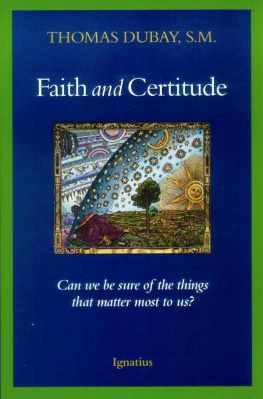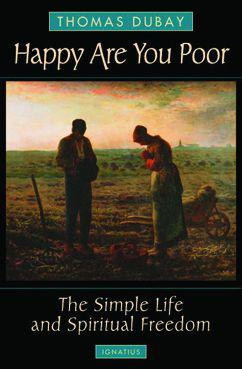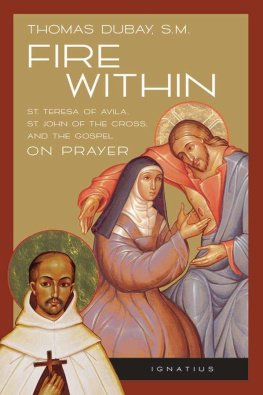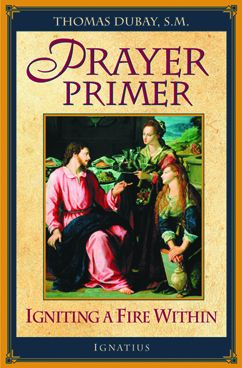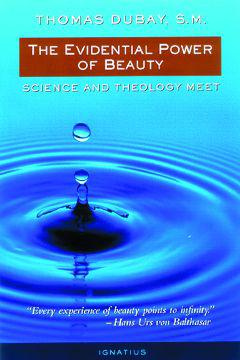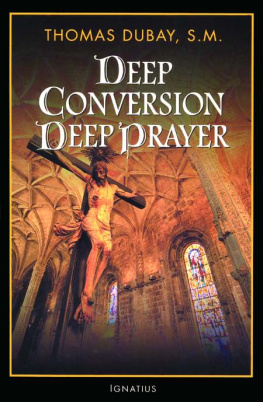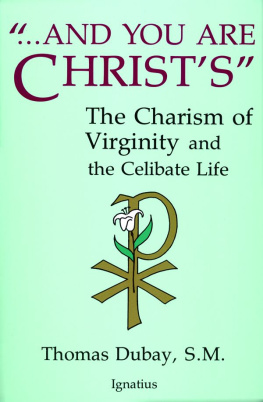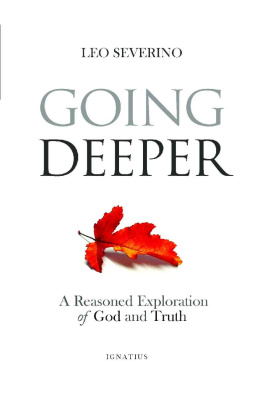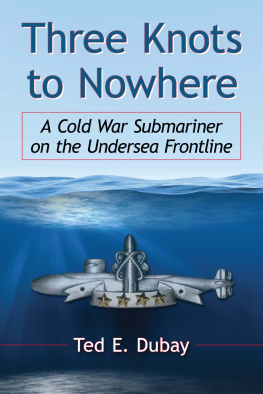FAITH AND CERTITUDE
THOMAS DUBAY. S.M.
FAITH
AND
CERTITUDE
IGNATIUS PRESS SAN FRANCISCO
Cover by Roxanne Mei Lum
With ecclesiastical approval
1985 Ignatius Press, San Francisco
All rights reserved
ISBN 978-0-89870-054-1
Library of Congress catalogue number 84-80910
Printed in the United States of America
ACKNOWLEDGMENTS
Because the seriously intended word wells up from our deepest recesses, its limitations easily escape the notice of its author. I am therefore immensely grateful to three friends who gave generously of their time and talent in improving the typescript by ridding it of many defects. Sister Mary Vincent Fritton, S.C.L., once again passed her sharp eyes over these pages and freed them of small typographical errors. Father Carl Telford, S.M., contributed his theological expertise in his evaluation of content, while Sister Margaret Mary Kingsley, S.N.J.M., improved the text with her insightful literary and stylistic comments.
But these three readers did me also the positive favor of commendation, as did another colleague, Father Leo Foley, S.M., who read and commented upon the entire typescript. Often a writer cannot be sure that what appears useful to him will prove beneficial to others. Seldom can he know that what he sees and likes will be seen and liked by his intended readers. No one can please everyone, of course, but it is a comfort to me to know that these friends have considered that this volume fills a contemporary need. For this, too, I am grateful.
Thomas Dubay, S.M .
CONTENTS
The inner empty ache... Is there a sure answer?... A spreading scepticism... Is apologetics the answer?... Our approachIs scepticism viable?... Universal scepticism... Partial scepticism... Roots of scepticism... Healthy receptivity... Our need for certitude... Ecclesial certitude... Practical reasons... Response to reality... Truth as symphonic... Convictions and difficultiesThe atmosphere of subjectivity... The extent of contemporary scepticism... The blurring of realityResistance to thinking... The nonthinking person... Academic chaos... Doubt and sin... Accommodations to secularism... The destruction of credibility... Chronological snobbery... Selectivity... Bigotry... Unconscious needs and motivation... ConclusionDoes certitude exist?... What is truth?... What is certitude?... Doubt and difficulty... Belief and faithSpecific, proximate motivationInadequacy of logical analyses... Convergence of evidences... Illustrative applicationsThe factual situation: secular sciences... The factual situation: biblical studies... Why scholarly errors?... Implications for finding truthAlternatives... A pastoral problem... What is biblical criticism? .. Value of historical-biblical study... Limitations of the method itself... Misuse of the method... Contradictions among exegetesIs certitude possible? .. Scripture needs an ecclesial community... Elitism versus democracy... Some specific questions... ImplicationsWhat is it to know?... Moral integrity... The pharisee problem... Conversion... Vision of the whole... Love for truth... Expenditure of effort... Role of the will... Certitude of faith... Science and religious commitment... Truth and the polls... Theology and prayerThe poverty of materialism... The dogmatism of materialism... Objections to Gods existence... The impossibilities of atheism... The idolatries of atheism... Atheism and meaninglessnessRadical trust in reality... The inner ache... Human transcendence... Our amazing universe... The proclamation of conscience... Experience of the transcendent... The handwriting of miracles... The figure of Jesus... A note on evil
CHAPTER ONE
THE EMPTY ACHE
There exists a depth in human existence in which knowing and decision, truth and goodness are no longer separated hut in which only the true have goodness and the good cannot fall away from truth .Karl Rahner
The human person alone is capable of boredom. Cows are not. They only look that way. We all know what boredom means when it is experienced in particular situations: a dull conversation, party or book. But I wish to speak of something more basic that a growing number of us experience. We may call this existential boredom, an apathy about life itself.
When a person is existentially bored, he may experience occasional pleasures, but for the most part his life is dreary, uninteresting, loveless. To him it also appears useless. Though he may retain some capacity for sense pleasures, he is incapable of the thrill of joy. He does not respond to reality. Splendid scenery, beautiful music, intellectual keenness, a sparkling personality all leave him untouched and unmoved. He may know the dictionary definition of genuine love, but he has no experience of it. He is a stranger to enthusiasm, and he feels both rootless and restless. Because he is incapable of interpersonal depth, he is in love with no one. People in love are not bored. Nor are they in doubt about the beloved one.
How does existential boredom come about? We may be sure that it is not preprogramed in our genes. Though ones environment, that is, ones interpersonal relationships, has a great deal to do with the genesis of this pervasive rootlessness, more important still is the persons use of his freedom. Like joy, its opposite, boredom is not first of all a result of what is out there: it is the quality of the person, not the state of the world.
Thoughtful, normal people are alive to a deeper dimension of human existence. They know from their deepest center that there is more to life than pleasure, power and prestige. They sense that ultimate insecurity and emptiness are abnormal and unsatisfying. Yet they see this unhealthiness everywhere. The condition of modern technological society contributes its share to the genesis of a fundamental restlessness in the individual. Parents begin the dulling process when they smother the childs natural inquisitiveness with a refusal to answer questions or by a failure to excite further interest. A wonderless education more concerned with facts than with amazement continues to deaden the youngster. A flood of experiences mostly on the sense level leaves the adolescent more and more blase, less and less impressed with what matters most in life, with what is deepest and most beautiful and most satisfying. Loss of innocence without its recovery continues the process, and lack of love finishes it off in the adult. The existentially bored man and woman have no vibrant goal. Their sense of the Real weakened, they are intellectually dead. Worst of all, they are not in love and they are probably well on the way to cynicism and scepticism. They are in desperate need of healing.
Yet we must get to a deeper level of explanation, for the above is mostly descriptive of symptoms. We have noted that cows do not get bored. They are as incapable of boredom as they are bereft of joy. The explanation is rooted in spirit and nowhere else. It is because the human person is the only inspirited being in visible creation that he is the only one capable of boredom.
Why is this so? Spirit is openness to everything. Matter is closed to everything but itself. An apple can be only an apple. It cannot stretch out beyond its skin. Nor can a squirrel. Material things are always confined to here and now. This is why cows are contentedwhich is very different from being happy. A cow is satisfied with being a cow. But a human being is never satisfied with being a man or a woman. Because we are spirit in the flesh we burst beyond the flesh. Necessarily so. It cannot be otherwise.
This is why we are never content with one experience of anything. If one happening ever did satisfy, we would stop with it, rest with it, be filled with it. Our endless seeking would end. But it never does.
Next page
